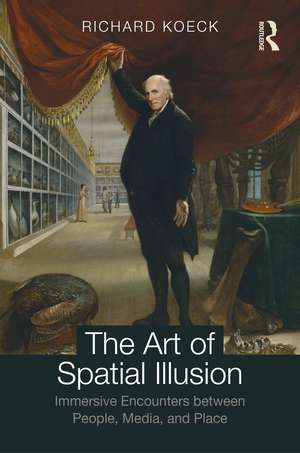The Art of Spatial Illusion: Immersive Encounters between People, Media, and Place
Autor Richard Koecken Limba Engleză Paperback – 16 dec 2024
The Art of Spatial Illusion: Immersive Encounters between People, Media, and Place is an insightful exploration of the evolving relationship between humans, media, and spatial environments, tracing their progression from the Renaissance, via Modernity and Postmodernity, to today’s digital age. The author offers a compelling reading and re-evaluation of architectural history and media theory, drawing connections between historical practices, technological innovations, and contemporary immersive experiences.
Inspired by scholars such as Walter Benjamin and Jean Baudrillard, the book discusses how technological advancements have transformed our situatedness in “image-spaces”, highlighting the shift from material authenticity to digital reproductions. The book is structured into four parts — The Surface, The Stage, The Interface, and The Hybrid — each exploring different aspects of spatial illusions and their implications. It offers a critical perspective on the creation of architectural, immersive environments, examining the motivations behind them and their broader cultural and political contexts.
Richly illustrated and deeply researched, The Art of Spatial Illusion is an essential reading for anyone interested in architecture and art as well as media archaeology, history, and theory. Seeing new, thought-provoking architectural propositions emerging on our horizon, the author provides a comprehensive understanding of how immersive experiences shape our perception of reality.
| Toate formatele și edițiile | Preț | Express |
|---|---|---|
| Paperback (1) | 289.73 lei 3-5 săpt. | +25.98 lei 10-14 zile |
| Taylor & Francis – 16 dec 2024 | 289.73 lei 3-5 săpt. | +25.98 lei 10-14 zile |
| Hardback (1) | 937.30 lei 6-8 săpt. | |
| Taylor & Francis – 16 dec 2024 | 937.30 lei 6-8 săpt. |
Preț: 289.73 lei
Nou
Puncte Express: 435
Preț estimativ în valută:
55.44€ • 58.04$ • 45.87£
55.44€ • 58.04$ • 45.87£
Carte disponibilă
Livrare economică 15-29 martie
Livrare express 04-08 martie pentru 35.97 lei
Preluare comenzi: 021 569.72.76
Specificații
ISBN-13: 9781138045569
ISBN-10: 113804556X
Pagini: 306
Ilustrații: 204
Dimensiuni: 156 x 234 x 18 mm
Greutate: 0.54 kg
Ediția:1
Editura: Taylor & Francis
Colecția Routledge
Locul publicării:Oxford, United Kingdom
ISBN-10: 113804556X
Pagini: 306
Ilustrații: 204
Dimensiuni: 156 x 234 x 18 mm
Greutate: 0.54 kg
Ediția:1
Editura: Taylor & Francis
Colecția Routledge
Locul publicării:Oxford, United Kingdom
Public țintă
Postgraduate, Professional, and UndergraduateCuprins
PART 1: THE SURFACE 1. 16/17th c. Theaters of the World: Curiosity Cabinets & Whispering Chambers 2. 18th c. Panoramic Space: Barker and the Re-Representation of Power 3. 19th c. Panoramic Precision: The Colosseum of Hornor and Parris PART 2: THE STAGE 4. Arrival in the Age of Moving Spectacles 5. Paris 1900: Spatial Illusions and Immersive Experiences 6. Early Cinema: Producing Moving Image Simulations PART 3: THE INTERFACE 7. Pre-Modern: Spaces of Purpose, Image and Performace 8. Modern: Immersed in Abstract Spaces, Signs and Systems 9. Post-Modern: Sign, Screens and Pixels CONCLUSION: THE HYBRID 10. Hybridized Realities: The Rise of Screen Corporeality 11. Concluding Remarks
Notă biografică
Richard Koeck is a Professor and Chair in Architecture and the Visual Arts in the School of Architecture at the University of Liverpool. He is also Director of CAVA | Centre for Architecture and the Visual Arts and founding director of the film/media company CineTecture in the UK. He is author of Cine-Scapes (2013) and co-/editor of several books on film and architecture. His cross-disciplinary R&D innovation and UKRI expertise is situated at the intersection of space, media, and culture with a particular interest in digital/immersive spaces. He led and collaborated on large projects in the architecture, creative arts, and entertainment sectors in the UK, China and Singapore.
Descriere
This book provides an insightful exploration of the evolving relationship between humans, media, and spatial environments. The author offers a compelling reading and re-evaluation of architectural history and media theory, drawing connections between historical practices, technological innovations, and contemporary immersive experiences.
